I consider him, inch for inch and pound for pound, the gamest fish that swims.
—James A. Henshall, Book of the Black Bass
Wednesday, 6 June, 1883, Cooper Institute in New York
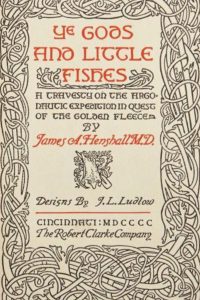 American Fish Culturists’ Association (AFCA) President George Shepard Page called the 12th Annual Meeting to order. In its first decade, AFCA (precursor to the American Fisheries Society) had grown from fewer than 10 members to more than 160. Page was a wealthy New York businessman, having made his fortune in coal tar products that allowed him to be a strong devotee of the gun and rod sports. His political savvy helped the AFCA grow in influence, and his New York office even served as the headquarters of AFCA for several years. He and then U.S. Congressman Robert B. Roosevelt were instrumental in persuading Congress to form the U.S. Fish Commission in 1871, and now Page was leading AFCA. He opened the meeting with comments regarding the Fisheries Exhibition in London from which he had recently returned, telling the group that the U.S. exhibit prepared by the Smithsonian was generally acknowledged to be the most creditable and educational of all the national exhibits. After extolling the rapid increase in fish culture across the United States and crediting the growth to AFCA and the formation of fish commissions in virtually every state, he turned to a topic that had become controversial among AFCA members and state fish commissions: the stocking of black bass Micropterus spp….Read more in the October 2020 issue of Fisheries.
American Fish Culturists’ Association (AFCA) President George Shepard Page called the 12th Annual Meeting to order. In its first decade, AFCA (precursor to the American Fisheries Society) had grown from fewer than 10 members to more than 160. Page was a wealthy New York businessman, having made his fortune in coal tar products that allowed him to be a strong devotee of the gun and rod sports. His political savvy helped the AFCA grow in influence, and his New York office even served as the headquarters of AFCA for several years. He and then U.S. Congressman Robert B. Roosevelt were instrumental in persuading Congress to form the U.S. Fish Commission in 1871, and now Page was leading AFCA. He opened the meeting with comments regarding the Fisheries Exhibition in London from which he had recently returned, telling the group that the U.S. exhibit prepared by the Smithsonian was generally acknowledged to be the most creditable and educational of all the national exhibits. After extolling the rapid increase in fish culture across the United States and crediting the growth to AFCA and the formation of fish commissions in virtually every state, he turned to a topic that had become controversial among AFCA members and state fish commissions: the stocking of black bass Micropterus spp….Read more in the October 2020 issue of Fisheries.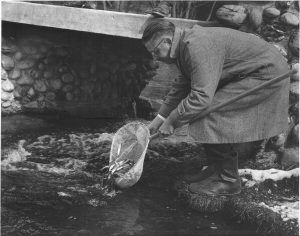
Howard Tanner releasing the first Coho Salmon into the Platte River, Michigan, in 1966. Image courtesy of Michigan Department of Natural Resources.
By Jesse T. Trushenski, James D. Bowker, Gary E. Whelan, and Jeff A. Heindel
Like fisheries science itself, the American Fisheries Society (AFS) began with fish culture when the pioneers of North American fish propagation amazed the public with their ability to coax food and fishing opportunities from pails of eggs and wriggling fry. Once considered a novelty or a hobby, fish culture transformed over the decades and has become an essential tool for fisheries management and conservation, as well as the single most important source of seafood in the world. In this paper, we delve into the history of North American fish culture, describe and provide examples of how AFS has influenced our understanding and use of hatcheries and hatchery‐origin fish, and imagine what transformations may yet await fish culturists….Read more in the September 2020 issue of Fisheries.
]]>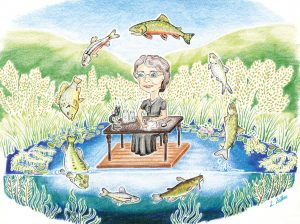 By Lauren Zatkos, Christina A. Murphy, Amanda Pollock, Brooke E. Penaluna, J. Andres Olivos, Emilee Mowlds, Christine Moffitt, Michael Manning, Christina Linkem, Lisa Holst, A. Brent Cárdenas, and Ivan Arismendi
By Lauren Zatkos, Christina A. Murphy, Amanda Pollock, Brooke E. Penaluna, J. Andres Olivos, Emilee Mowlds, Christine Moffitt, Michael Manning, Christina Linkem, Lisa Holst, A. Brent Cárdenas, and Ivan Arismendi
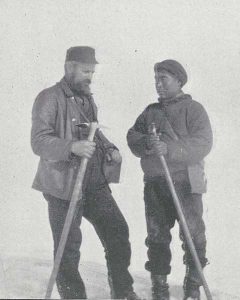
W. E. Meehan (left) with Daniel Broberg, the Arctic expedition’s Native interpreter.
By Daniel Shaw
William E. Meehan, my great‐great‐grandfather, had both professional accomplishment and humiliation as he served from 1910 to 1911 as the American Fisheries Society’s 30th President (https://bit.ly/3cT9Cqx). He was a contemporary of Theodore Roosevelt and Gifford Pinchot, and like them, embraced civic engagement, outdoor adventure, and the emerging conservation ethic of their shared era. As a scientific researcher and prolific author for both lay and technical audiences, Meehan’s impacts were wide and still linger over a century later. As a modern day AFS member, I see where some of his accomplishments and ideas still positively reverberate through the organization and profession. Likewise, I have spent part of my career dealing with the unintended consequences of some of his and his generation’s fisheries management actions. Perhaps most intriguing of all to me is that I am continuing to fight for his political battles for clean water, healthy fisheries, and strong communities….Read more in the August 2020 issue of Fisheries.
]]>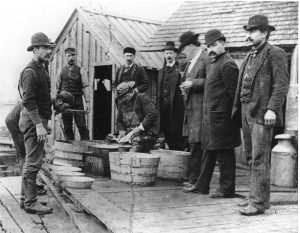
Lake Whitefish egg take on the Detroit River by the Michigan Fish Commission, circa 1885. Courtesy: Michigan State Archives.
By Gary E. Whelan, Diana M. Day, John M. Casselman, Laura Gephart, Carolyn J. Hall, James Lichatowich, Michael Matylewich, Leandro Miranda, Leanne Roulson, Patrick D. Shirey, Norman Mercado-Silva, John Waldman, and Drue Winters
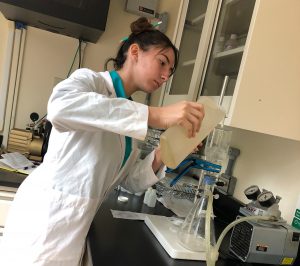
Hutton Scholar Camila Diaz working with the U.S. Forest Service in Puerto Rico
By Mary Webb Banning
During the 130th AFS Annual Meeting in 2000, two long‐time American Fisheries Society members, Kenneth Beal and Gene Fritz, presented the idea of an innovative, hands‐on high school summer internship program, sponsored by AFS, to the Governing Board. The internship was designed to help recruit and introduce high school students from underrepresented backgrounds to fisheries and aquatic sciences and to spark interest in students who may not have considered a profession working in fisheries. The program was named in honor of the late Robert F. Hutton, AFS Past President and Executive Director. Through the Hutton Junior Fisheries Biology Program, AFS is continuing its work to both strengthen and diversify the fisheries profession….Read more in the August 2020 issue of Fisheries.
]]>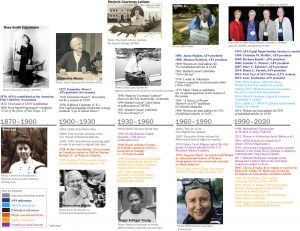 By Christina A. Murphy, Lauren Zatkos, Kelsi Antonelli, A. Brent Cárdenas, Christina Linkem, Michael Manning, Juan Andres Olivos, Brooke E. Penaluna, Amanda Pollock, and Ivan Arismendi
By Christina A. Murphy, Lauren Zatkos, Kelsi Antonelli, A. Brent Cárdenas, Christina Linkem, Michael Manning, Juan Andres Olivos, Brooke E. Penaluna, Amanda Pollock, and Ivan Arismendi
In light of the profound influence that women have had in fisheries science and AFS, we recognize contributions of some of the historical mothers of fishes and AFS, in keeping with the theme of “The Father of All the Fishes” (Murphy 2020). Women have challenged accepted wisdom in fisheries and led AFS vibrantly, especially since the 1990s. These vignettes highlight a range of time periods and geographies, and attempt to include a subset of well‐known as well as underrecognized scientists. While we recognize that many amazing women are not profiled below, we hope to have captured some of the diversity of contributions both inside and outside of AFS. Without these women, we would have missed fundamental leadership, novel advances, and overall progress in the field. By chronicling the contributions of some of the many women who helped build our science and our Society over the past 150 years, we hope to highlight the ongoing importance of women in fisheries and AFS and spark a more inclusive global fisheries community and workforce for everyone….Read more in the July 2020 issue of Fisheries.
]]>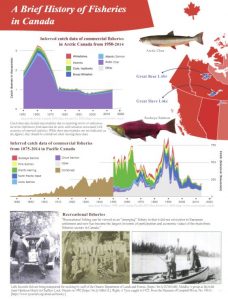
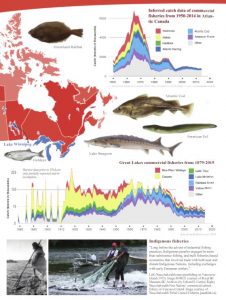 By Rowshyra A. Castañeda, Colleen M. M. Burliuk, John M. Casselman, Steven J. Cooke, Karen M. Dunmall, L. Scott Forbes, Caleb T. Hasler, Kimberly L. Howland, Jeffrey A. Hutchings, Geoff M. Klein, Vivian M. Nguyen, Michael H. H. Price, Andrea J. Reid, James D. Reist, John D. Reynolds, Alexander Van Nynatten, and Nicholas E. Mandrak
By Rowshyra A. Castañeda, Colleen M. M. Burliuk, John M. Casselman, Steven J. Cooke, Karen M. Dunmall, L. Scott Forbes, Caleb T. Hasler, Kimberly L. Howland, Jeffrey A. Hutchings, Geoff M. Klein, Vivian M. Nguyen, Michael H. H. Price, Andrea J. Reid, James D. Reist, John D. Reynolds, Alexander Van Nynatten, and Nicholas E. Mandrak
To celebrate the American Fisheries Society 150th anniversary, we present a brief history of Canadian fisheries, from Indigenous to recreational to commercial. We take you across the country, starting in the Atlantic Ocean, inland through Canada, exploring the Great Lakes and other lakes, north to the Arctic Ocean, and, finally, dive into the Pacific Ocean. We also highlight specific case studies that exemplify the challenges of managing such diverse fisheries resources and briefly celebrate some of the prominent Canadian fisheries scientists who have helped to build capacity of science‐based fisheries management in Canada….Read more in the June 2020 issue of Fisheries.
]]>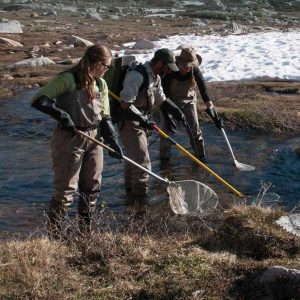
Photo from U.S. Fish and Wildlife Service.
Electrofishing may be broadly defined as the use of electricity to capture or control fish. The concept began on October 26, 1863, when Isham Baggs of Islington, Middlesex County, England, applied for a patent entitled Improvements in the Means of and Apparatus for Paralysing, Capturing or Killing Fish, Birds and Other Animals (Baggs 1863; Figure 1). Mr. Baggs was a visionary, proposing to use a battery to, among other intents, capture fish with electrified hooks, harpoons, and “metal‐sheathed” boats. He even proposed using lenses of the gemstone tourmaline to polarize light for improved vision into water. His patent came among a flood of proposals for various applications of electricity as the world embraced this new technology. Despite the rapid pace of electrical discoveries during the first 6 decades of the 19th century, the Baggs patent was unfulfilled because the batteries then available could not produce sufficient energy to meet the proposed tasks….Read more in the May 2020 issue of Fisheries.
]]>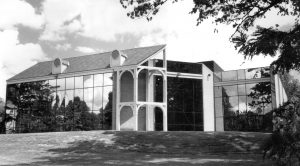
AFS headquarters are housed in the Glascock Building in Bethesda, Maryland.
By Christine Moffitt, Robert M. Hughes, Doug Austen, Tom Bigford, Beth Beard, Dan Cassidy, and Aaron Lerner
In this paper, we highlight the growth, professional involvement, and impact of AFS over the past 25 years. This increment follows summaries of the years 1970 to 1995, provided by Mary Frye and John Gottschalk on the occasion of the AFS 125th Anniversary (Frye and Gottschalk 1995). Their update followed an exceptionally comprehensive compilation of the centennial history of AFS in Special Publication 7, A Century of Fisheries in North America , edited by Norman Benson. Three chapters of the centennial book reviewed AFS development and growth. Paul Thompson summarized the first 50 years, Benson covered Society development in the next 50 years, and Robert Hutton, AFS Executive Director in 1970, provided a state of the Society with details of the 100th anniversary year’s activities. A photographic history of AFS provided by Moffitt (2001) supplemented the story of the first 130 years of AFS. Each publication documented the growth of professionalism, policies, and procedures that remain at the heart of how AFS conducts business and contributes to its long‐term success….Read more in the April 2020 issue of Fisheries.
]]>